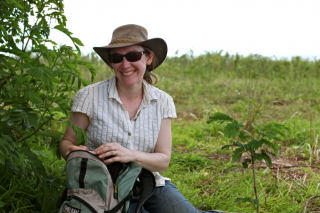The Unitarian Universalist Association (UUA) partnered with the Unitarian Universalist Service Committee (UUSC) on a joint volunteer trip to Haiti, April 28–May 5, 2012. In the post below, trip participant Jocelyn Furbush writes about the hope and inspiration she experienced with the Papaye Peasant Movement, a UUSC partner in Haiti. The UUSC-UUA Haiti Volunteer Program is made possible through the contributions of UUA and UUSC donors and a generous grant from the Veatch Program of the UU Congregation at Shelter Rock, in Manhasset, N.Y.
In the United States, we mostly hear bad news about Haiti. I suspect that in the outpouring of support after the earthquake, many donors like me gave with the thought of temporarily alleviating suffering. We didn't expect to permanently lift anyone out of poverty, let alone transform the country. It's hard to imagine changing deeply rooted systems of power and oppression. It's hard to imagine restoring a depleted environment to the point where it could provide a decent life to millions of people, ensuring that the inherent worth and dignity of each is respected. Nonetheless, I came here in search of hope that both those things were possible — and that's exactly what I've found.
One example of this living hope is the home garden of Moccene, an MPP youth leader. His inspiring success in improving soil productivity (and thus family income and well-being) through creative and organic methods represents more than a single story of someone making a positive change. Because this change grew from and continues through a mature and sophisticated system of community organizing and because this young farmer connects his personal actions to the larger political struggle for food sovereignty, I truly believe it represents a movement.
Another example of hope stirring in Haiti is seen in the MPP's cooperatives, not just for agricultural production but for value-added processing from what's grown. These co-ops craft jams, peanut butter, honey, and I'm sure more to come. The twin pines logo on the jars connect the system of equal shared investment and reward that created these products to cooperatives of all kinds around the world. In 2012, the International Year of Cooperatives, I'm especially honored to learn from Haitians who are building the kind of cooperative economy I'd like to see in my corner of the world.
Just one more beacon from my short time here has been the joy and human connection I've found with my fellow UU travelers and the Haitians we've worked and eaten beside. I've discovered the power of spontaneous song and dance to cross language barriers. I've seen incredible resilience, generosity, humor, love, and faith. As I reconnect with my own UU faith and the space it creates in my life for balancing social-justice action with reflection, I'm blessed to be witnessing the community bonds here. They are strong enough to mobilize members to action and flexible enough to welcome newcomers. MPP calls their organizers “animators,” which brings to mind waking the community up to its own potential and sparking it with new life. In returning home, I hope to be more of an “animatrice” than an activist, waking people like me to the hope Haiti has for itself and to offer to the rest of us.
